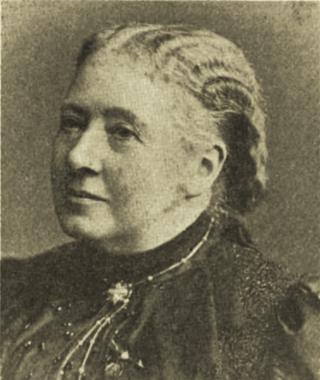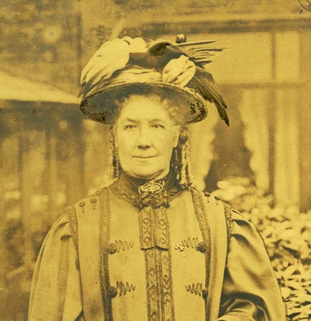Related Research Articles

The temperance movement is a social movement promoting temperance or complete abstinence from consumption of alcoholic beverages. Participants in the movement typically criticize alcohol intoxication or promote teetotalism, and its leaders emphasize alcohol's negative effects on people's health, personalities and family lives. Typically the movement promotes alcohol education and it also demands the passage of new laws against the sale of alcohol, either regulations on the availability of alcohol, or the complete prohibition of it.
The Woman's Christian Temperance Union (WCTU) is an international temperance organization. It was among the first organizations of women devoted to social reform with a program that "linked the religious and the secular through concerted and far-reaching reform strategies based on applied Christianity." It plays an influential role in the temperance movement. Originating among women in the United States Prohibition movement, the organization supported the 18th Amendment and was also influential in social reform issues that came to prominence in the progressive era.

Hope UK is a United Kingdom Christian charity based in London, England which educates children and young people about drug and alcohol abuse. Local meetings started in 1847 and a formal organisation was established in 1855 with the name The United Kingdom Band of Hope Union.

Margaret Bright Lucas was a British temperance activist and suffragist. She served as president of the British Women's Temperance Association (BWTA), the World's Woman's Christian Temperance Union (WCTU), and the Bloomsbury branch of the Women's Liberal Association.

The White Ribbon Association (WRA), previously known as the British Women's Temperance Association (BWTA), is an organization that seeks to educate the public about alcohol, tobacco, and other drugs, as well as gambling.
Temperance – moderation, self-restraint, esp in eating and drinking, moderate use of, or total abstinence from, alcoholic liquors as beverages; ~ society etc. for restriction or abolition of use of alcoholic drinks. L temperantia.
The temperance movement in the United Kingdom was a social movement that campaigned against the recreational use and sale of alcohol, and promoted total abstinence (teetotalism). In the 19th century, high levels of alcohol consumption and drunkenness were seen by social reformers as a danger to society's wellbeing, leading to social issues such as poverty, child neglect, immorality and economic decline. Temperance societies began to be formed in the 1830s to campaign against alcohol. Specific groups were created over periods of time dedicated to the different aspects of drinking. For example, in 1847, the Band of Hope was created to persuade children not to start drinking alcohol. Most of these temperance groups were aimed at the working class. Temperance was also supported by some religious groups, particularly the Nonconformist Churches. Although the temperance movement met with local success in parts of Britain, it failed to impose national prohibition, and disappeared as a significant force following the Second World War.

Norman Shanks Kerr was a Scottish physician and social reformer who is remembered for his work in the British temperance movement. He originated the Total Abstinence Society and was founder and first president of the Society for the Study and Cure of Inebriety which was founded in 1884.

Margaret Eleanor Parker (1827–1896) was a British social activist, social reformer, and travel writer who was involved in the temperance movement. She was a founding member of the British Women's Temperance Association (BWTA) in 1876, and served as its first president. Born in England, Parker resided in Scotland. She was a delegate to the 1876 International Organisation of Good Templars (IOGT) meeting which led to the formation of the BWTA. She was also instrumental in founding the World Woman's Christian Temperance Union (WWCTU). In 1881, she founded another type of women's association, one which focused on horticulture and supply, but it did not flourish. Parker described her travels in the Eastern United States in Six Happy Months amongst the Americans (1874).

Frances Julia Barnes was an American temperance reformer. She served as General Secretary of the Young Woman's Branch of the Woman's Christian Temperance Union (WCTU).

Women's Christian Temperance Union of New Zealand is a non-partisan, non-denominational, and non-profit organisation that is the oldest continuously active national organisation of women in New Zealand. The national organisation began in 1885 during the visit to New Zealand by Mary Clement Leavitt, the first world missionary for the Woman's Christian Temperance Union. The WCTU NZ was an early branch of the World Woman's Christian Temperance Union and a founding affiliate of the National Council of Women of New Zealand. Men may join the WCTU NZ as honorary members.

Mary Elizabeth Docwra was a British temperance activist who was president of the British Women’s Temperance Association in 1898.

Elizabeth Philippa Biddulph, Baroness Biddulph was an English humanitarian and temperance leader. She published a biography of her father, Charles Yorke, 4th Earl of Hardwicke, and was appointed a Woman of the Bedchamber by Queen Victoria.
Lucy Ann Brooks was an English temperance advocate. She was an officer of the British Women's Temperance Association before becoming a co-founder and president of the Women's Total Abstinence Union (WTAU).
Non-Partisan National Women's Christian Temperance Union was an American temperance association organized at Cleveland, Ohio, January 22, 1890, as a protest against the attitude of the Woman's Christian Temperance Union (W.C.T.U.) toward political parties.

Alice Brown Caine was an English temperance leader. She served as president of the Women's Total Abstinence Union, the Liverpool Ladies' Temperance Association, and the Deaconesses' National Total Abstinence League.
Jane Ferguson Gemmill, was a Scottish temperance activist who founded the Whiteinch Band of Hope and the Partich Branch of the Woman's Christian Temperance Union (W.C.T.U.). She was also affiliated with the British Women's Temperance Association (B.W.T.A.) and the Scottish Temperance Alliance. Gemmill was the only woman candidate in the municipal election of 1907 in the Glasgow district.

Elizabeth Anne Lewis was a British temperance activist and local missionary. Throughout her life, she was devoted to the moral suasion phase of the temperance movement. She was a vice-president of the British Temperance League, the London Temperance Hospital, the Women's Total Abstinence Union, and the National British Temperance Association. She held the United Kingdom Alliance in high regard.
Ann Watt Milne was a Scotch temperance leader who served as president of the British Women's Temperance Association (BWTA).
References
- 1 2 3 4 Mitton, Geraldine Edith; Hubbard, Louisa M.; Janes, Emily (1899). "WOMEN AND TEMPERANCE WORK, BY COUNCILLOR J. MALINS". The Englishwoman's Year Book and Directory for the Year ... F. Kirby, Publisher. pp. 23, 216–17. Retrieved 21 July 2022.
 This article incorporates text from this source, which is in the public domain .
This article incorporates text from this source, which is in the public domain . - ↑ "140 Years of the White Ribbon Association (Part Two)". White Ribbon Association. Retrieved 10 January 2021.
- ↑ Doughan, David; Gordon, Professor Peter; Gordon, Peter (3 June 2014). Dictionary of British Women's Organisations, 1825-1960. Routledge. ISBN 978-1-136-89770-2 . Retrieved 21 July 2022.
- ↑ Law, Jonathan; Martin, Elizabeth A. "brewster sessions". A Dictionary of Law. Oxford University Press. Retrieved 2022-07-23.
- 1 2 3 4 Smith, Frederic (1897). The Jubilee of the Band of Hope Movement: A Jubilee Volume. United Kingdom Band of Hope Union. pp. 215–16. Retrieved 21 July 2022.
 This article incorporates text from this source, which is in the public domain .
This article incorporates text from this source, which is in the public domain .